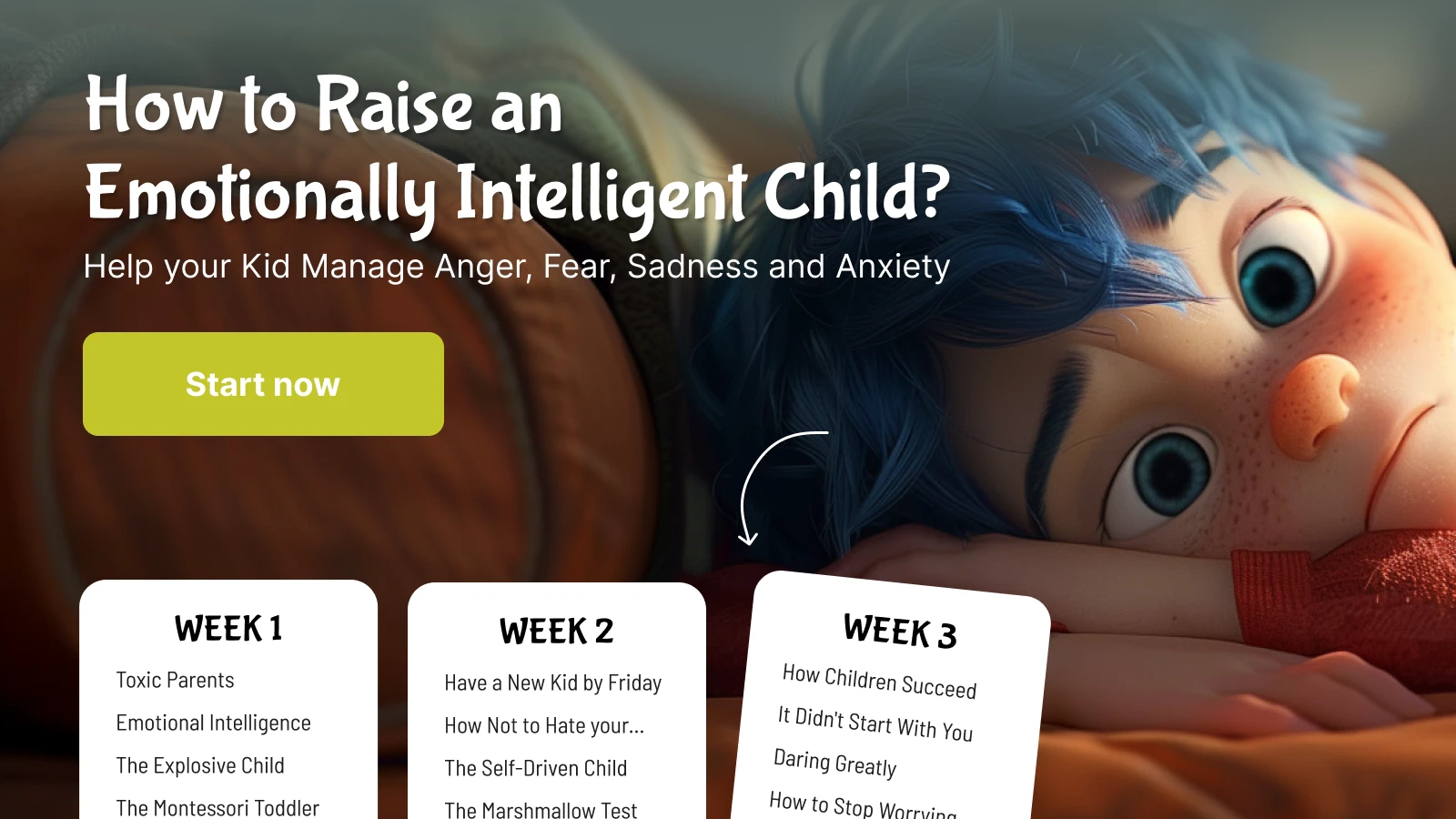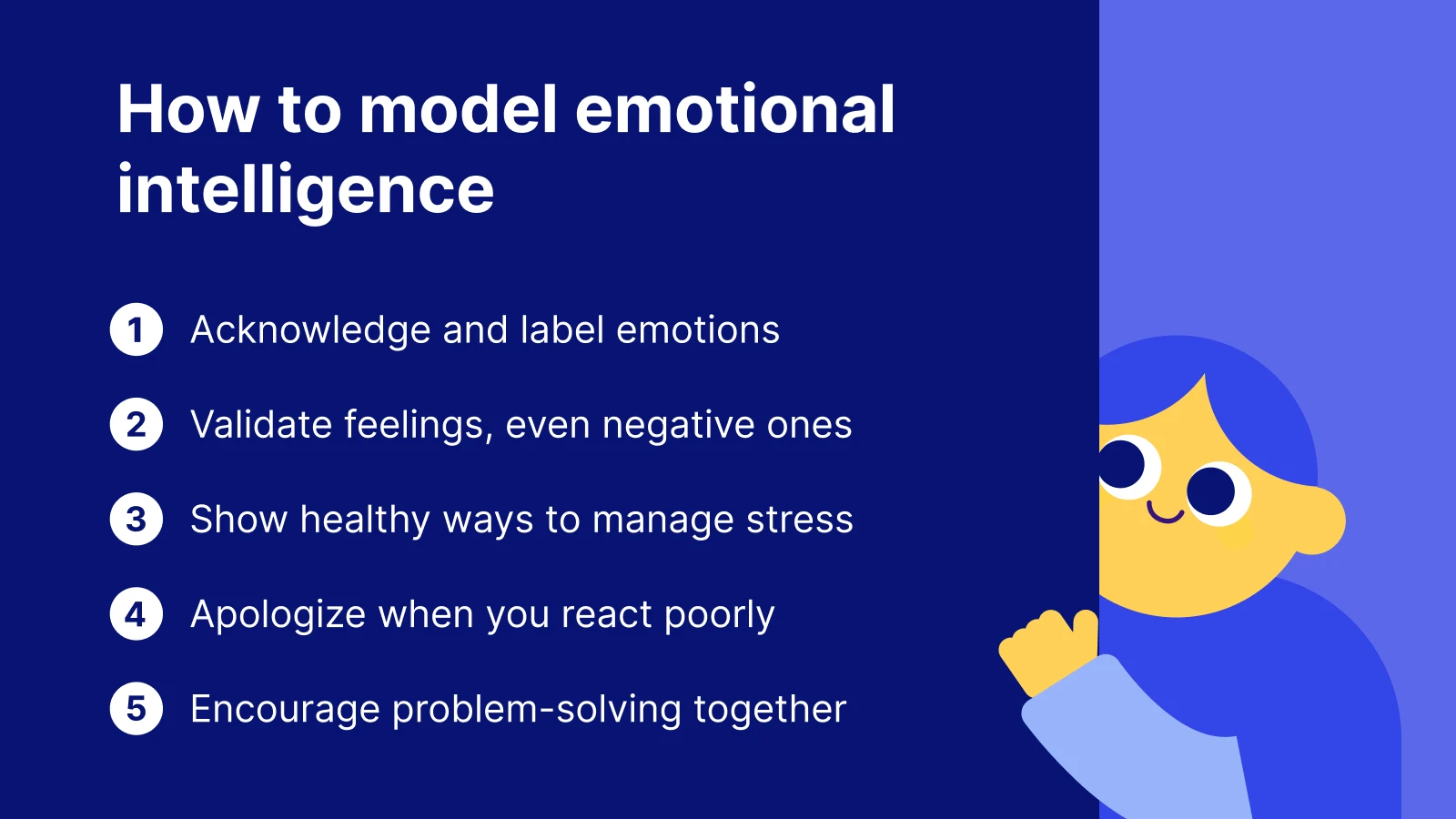What if your child could easily make friends, handle setbacks, and show compassion? It sounds like every parent’s dream! Nurturing an emotionally intelligent child requires helping them recognize and manage feelings, develop empathy, and build positive social skills. This article provides practical advice and strategies for fostering emotional intelligence in children by teaching them to identify big emotions, demonstrate emotional awareness, learn emotional expression, encourage empathy, and enhance problem-solving skills to aid their emotional growth.
Key takeaways
Emotional intelligence (EQ) is important for kids as they grow. It helps them become more self-aware, empathetic, and socially skilled, making it easier to build strong relationships.
Teaching kids emotional intelligence prepares them for success in school, improves their mental health, and strengthens their friendships.
Parents can help by encouraging open conversations and showing how to manage emotions in everyday situations. This teaches kids to understand and express their feelings in healthy ways.
Understanding emotional intelligence in children
Emotional intelligence (EQ) is the ability to understand, express, and manage your emotions while building good relationships with others. Dr. John Gottman, the author of ‘Raising an Emotionally Intelligent Child,’ says that teaching kids EQ is key to their emotional health and resilience. According to Gottman, EQ includes:
Self-awareness
Self-control
Empathy
Social skills
These skills help kids connect with others and grow emotionally strong. Gottman explains that children aren’t born with EQ; they learn it through guidance and a supportive environment.
As kids grow, they get better at recognizing and handling their own emotions. Gottman’s research shows that parents have a big role in this. By helping kids understand their feelings, set limits, and solve problems, parents can teach valuable skills. One helpful approach is called emotion coaching. This means parents acknowledge their child’s emotions, show understanding, and guide them in finding solutions.
Books like 'The Whole-Brain Child' by Daniel J. Siegel and Tina Payne Bryson provide additional insights into how parents can nurture emotional intelligence. This includes strategies for teaching empathy and social skills, which Gottman also highlights as essential for building strong family connections and an emotionally healthy home.
The advantages of raising an emotionally intelligent child
While the importance of providing our children with a foundation for emotional intelligence is undeniable, understanding the specific benefits can strengthen our commitment to promoting EQ in our children's lives. Experts point out the following advantages:
1. Better academic performance
In his work 'Emotional Intelligence,’ Daniel Goleman notes that children with high EQ often perform better in school. Their ability to focus, regulate emotions, and stay resilient when facing challenges helps them succeed. These skills also promote teamwork and effective communication, which are indispensable for achieving academic success.
2. Stronger interpersonal relationships
As highlighted in 'The Whole-Brain Child' by Daniel J. Siegel and Tina Payne Bryson, children with strong emotional intelligence typically form deeper friendships and maintain healthier social interactions. Their awareness of emotions helps them resolve conflicts effectively, show empathy, and build lasting relationships — all crucial skills for lasting social success.
3. Improved mental health
Marc Brackett emphasizes in 'Permission to Feel' that emotionally intelligent children simply handle stress and life's challenges better. Teaching children to recognize and express their emotions prevents emotional suppression and supports their overall well-being, acting as a safeguard against anxiety and depression. This emotional awareness boosts self-esteem and helps maintain stable mental health throughout their lives.
Nurturing a child's emotional intelligence equips them with essential tools for academic success, social interactions, emotional well-being, and even physical health. This investment in their growth prepares them to face life's challenges with confidence and empathy.
Recognizing and labeling emotions
Helping kids understand and name their emotions is key to building emotional intelligence. This skill helps them better handle their feelings and express themselves clearly. Parents play an important role, especially in guiding sensitive kids to recognize both big and small emotions.
Teaching kids to use words like "hurt," "angry," or "happy" helps them label their feelings. This skill is important for self-control and setting boundaries, especially during tough moments like tantrums. Parents can also point out body language, like clenched fists or a frown, to help kids understand what their emotions look like.
Talking about emotions regularly builds a child’s emotional vocabulary and makes it easier for them to share their feelings. Discussing how characters feel in stories can strengthen this skill, and guidance from a reading comprehension tutor may help children better understand emotional nuances in what they read. Fun activities like games, songs, and stories can make learning about emotions interactive and enjoyable. A strong emotional vocabulary helps kids manage their emotions and connect with others with empathy and understanding.
How to model emotional intelligence: A five-step plan
Modeling emotional intelligence is essential because children learn by watching their parents, including how they handle challenges or bad behavior. Dr. John Gottman provides these practical strategies for parents to demonstrate emotional intelligence:
Acknowledge and label emotions
When you or your child feels an emotion, say it out loud. For instance, say, "I feel frustrated because this task isn't going as planned." This practice helps children expand their emotional vocabulary and recognize that emotions are a normal part of life.Validate feelings, even negative ones
Instead of dismissing sadness or anger, acknowledge your child's feelings: "I see that you're upset because your toy broke. It's okay to feel sad about that." Validating emotions teaches children that their feelings matter.Show healthy ways to manage stress
Model calming techniques, like taking deep breaths, counting to ten, or going for a walk when overwhelmed. These strategies give children practical tools for self-regulation during emotional moments.Apologize when you react poorly
If you lose your temper, apologize and explain: "I'm sorry I yelled earlier. I was feeling stressed and should have taken a moment to calm down." This action shows children that making mistakes is part of life and that repairing relationships matters.Encourage problem-solving together
Include your child in finding solutions by asking, "How can we solve this together?" This collaborative approach not only helps resolve issues but also teaches children empathy and teamwork.
By consistently modeling these behaviors, parents create a supportive environment where emotional intelligence becomes a natural part of family interactions. This foundation strengthens parent-child relationships and sets the stage for children to develop healthy coping mechanisms, a critical skill for navigating life's challenges.
Developing healthy coping mechanisms
Healthy coping mechanisms are essential for children to manage negative emotions and enhance emotional literacy effectively. Teaching skills like deep breathing can help them regulate their feelings and calm down when upset. Techniques such as 'balloon breathing' or 'box breathing' can be invaluable in soothing a child during a meltdown and managing their stress and anxiety.
Creating a calm-down kit filled with items like a coloring book, soothing music, or scented lotions can give children the tools to relax and self-soothe. Additionally, adding mindfulness practices into their daily routines can further improve emotional regulation, enabling children to handle their emotions in a healthy manner.
By developing these coping mechanisms, children can better manage frustration and reduce impulsive behavior, which fosters resilience and emotional stability. These skills are crucial for maintaining mental health and building emotional intelligence.
Building problem-solving skills
Problem-solving skills are vital to emotional intelligence and help children tackle challenges effectively. Parents can assist their children in identifying at least five possible solutions to a problem and evaluating the advantages and disadvantages of each. This approach encourages critical thinking and informed decision-making skills.
When children make mistakes, discuss what they could have done differently to help them make better future choices. Being patient and allowing children time to solve problems independently builds both their problem-solving abilities and confidence.
Strong problem-solving skills help children face challenges with a solution-focused mindset, which is advantageous in their personal and professional lives. These techniques not only enhance emotional intelligence but also equip children to handle life's inevitable challenges.
Recommended resources
To further support your efforts in raising an emotionally intelligent child, consider exploring a variety of expert-backed resources.
1. 'Raising an Emotionally Intelligent Child' by Dr. John Gottman
Raising an Emotionally Intelligent Child' by Dr. John Gottman offers valuable insights and practical strategies for nurturing emotional awareness and fostering strong parent-child bonds.
2. 'Emotional Intelligence' by Daniel Goleman
Daniel Goleman's 'Emotional Intelligence' provides a comprehensive foundation on the importance of EQ in both personal and professional lives, emphasizing its role in long-term success.
3. 'Emotional Intelligence 2.0' by Travis Bradberry and Jean Greaves
Meanwhile, Travis Bradberry and Jean Greaves's 'Emotional Intelligence 2.0' offers actionable techniques for understanding and developing EQ in everyday life.
4. 'The Whole-Brain Child' by Daniel J. Siegel and Tina Payne Bryson
'The Whole-Brain Child' by Daniel J. Siegel and Tina Payne Bryson focuses on strategies to support your child's developing mind, providing parents with tools to handle emotional outbursts and promote healthy emotional growth.
5. 'Permission to Feel' by Marc Brackett
Similarly, 'Permission to Feel' by Marc Brackett introduces a science-based approach to emotional intelligence, helping parents understand the critical role emotions play in decision-making, relationships, and well-being.
For those who enjoy multimedia learning, online platforms like Headway offer in-depth articles and book summaries on emotional intelligence and child development. These resources can help you gain the knowledge and tools needed to raise emotionally intelligent children, equipping them for a lifetime of success and well-being.
Empower your parenting with the Headway app
Raising an emotionally intelligent child is one of the best investments you can make for their future. It builds a foundation for lifelong success and happiness. Teaching kids to recognize emotions, set boundaries, and show empathy gives them the tools to face challenges with confidence and resilience.
If you’re looking for expert advice, the Headway app can help. It offers quick summaries of top parenting books like 'Raising an Emotionally Intelligent Child' by Dr. John Gottman, 'The Whole-Brain Child' by Daniel J. Siegel and Tina Payne Bryson, and 'Permission to Feel' by Marc Brackett. In just 15 minutes, you’ll learn practical strategies to help your child manage emotions and grow their emotional intelligence.
The app’s easy-to-use format makes learning simple, even for busy parents and caregivers. Download Headway today to explore expert insights and strengthen your child’s emotional and social skills. Foster empathy, encourage open communication and help your child thrive in every area of life.
Frequently Asked Questions
What is emotional intelligence (EQ)?
Emotional intelligence (EQ) is your superpower to understand and manage emotions, both yours and others. It enhances your relationships and overall well-being. Embrace EQ to connect more deeply with those around you!
Why is raising an emotionally intelligent child so important?
Raising an emotionally intelligent child is crucial for their future success and well-being. It equips them with the skills to build strong relationships and make sound decisions throughout life.
How can parents help children recognize and label their emotions?
To effectively help your child recognize and label their emotions, use clear feeling words, point out physical clues in their behavior, and engage them in activities like games and storytelling. This approach encourages emotional awareness and builds their confidence!
What are some practical ways to teach empathy to children?
To effectively teach empathy to children, engage them in role-playing and discussions about feelings in stories or movies, and encourage acts of kindness. These activities will help cultivate their understanding and connection to others' emotions, making a lasting impact.
What resources can help parents raise emotionally intelligent children?
To raise emotionally intelligent children, check out impactful books like 'Raising an Emotionally Intelligent Child' by Dr. Gottman and 'The Whole-Brain Child' by Siegel and Bryson. Utilize online resources and interactive tools to enhance your parenting journey!









